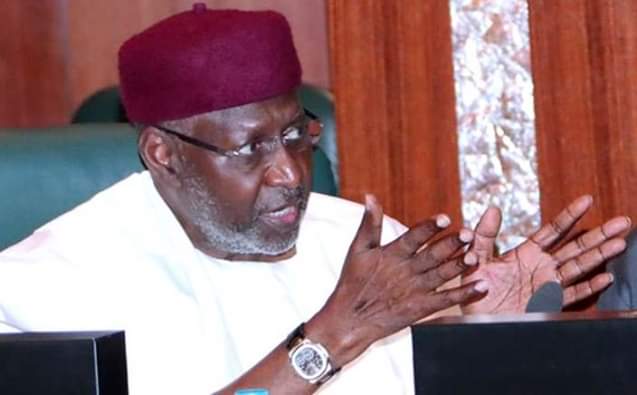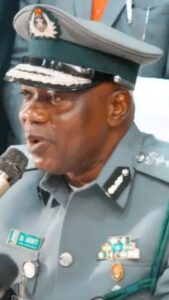
OLALEKAN ADETAYO writes on the life and times of Abba Kyari, who until his death on Friday, was the chief of staff to the President, Major General Muhammadu Buhari (retd.)
It was one of the rare moments he appeared in another outfit apart from his traditional white agbada and wine coloured Kanuri native cap. The Chief of Staff to the President, Abba Kyari, was in suit! It will take a closer look for one to recognise him in the picture. That was the picture of his last official assignment abroad. He had visited Germany with the Minister of Power, Sale Mamman. Their mission, according to the government, was to attract investment in power sector to the country. Rather than accomplish that, Kyari unwittingly ended up contracting the dreaded coronavirus which eventually snuffed life out of the unobtrusive but powerful presidential aide on Friday.
Mamman had tweeted the pictures in question with the caption: “The Chief of Staff to the President, Mallam Abba Kyari, and I are in Munïch right now meeting with executive members of @Siemens to discuss issues relating to the Nigerian power sector. The Nigerian Ambassador to Germany H.E @YusufTuggar has joined us for this meeting.” Members of that delegation returned to the country in mid-March and shortly thereafter, Kyari was pronounced to have tested positive for the deadly virus.
Kyari, whose remains were interred at the Gudu Cemetery, Abuja on Saturday morning, was the rallying point of presidential aides and government officials at the Presidential Villa, Abuja during his lifetime. He can be appropriately described as the spine of the regime of the President, Major General Muhammadu Buhari (retd.).
Buhari appointed Kyari as his Chief of Staff on August 27, 2015, barely three months after he was inaugurated as the President. Since then, the former banker and ex-journalist did not leave anyone in doubt about his huge influence on the President.
His role gave him the power, to a large extent, to decide who the President can see, where he can visit and other decisions he should take. The President himself pronounced that nothing comes to his table without passing through his chief of staff. He was the President’s alter ego. Expectedly, this role made many, including some of the President’s cabinet and family members, to see him as a stumbling block whenever they cannot have their ways.
Using the words of a former senator from Kaduna State, Shehu Sani, the late Chief of Staff took the bullets for his principal. Sani captured it pertinently when, in his tribute, he wrote: “Abba Kyari: The President has lost a trusted and loyal friend. A man who took the bullets of his master with smiles, calmness and silence. We knew his cap and his colours but never his mind or his own side of his story. He will be missed as a Punchman or a punch.”
For instance, not a few people hold the belief that Kyari was the brain behind Buhari’s refusal to grant the former Chairman of the Federal Inland Revenue, Babatunde Fowler, a second term in office. Those who hold that belief will quickly point to the query he issued to the former tax man shortly before he was denied the opportunity for a second term.
Another incident that those who belong to this school of thought will quickly point to was the suspension and subsequent exit of Mrs Winifred Oyo-Ita as the Head of the Civil Service of the Federation. Oyo-Ita had an open brush with Kyari after the controversial reinstatement and subsequent posting of a former Chairman of the Pension Reforms Commission, Abdulrasheed Maina, became public. The altercation which took place at the Council Chambers of the Presidential Villa, Abuja was believed to be based on Oyo-Ita’s leaked memo to Kyari in which she claimed that Buhari was aware of Maina’s reinstatement and that she warned the President against it. Oyo-Ita had claimed that her warning was based on the implications such reinstatement would have on the anti-corruption war of the Federal Government. Kyari must have believed that Oyo-Ita leaked the memo to embarrass the government. A week after they made a public show of their disagreement at the Council Chambers, they also returned to the same venue to announce their reconciliation. That notwithstanding, many still attributed Oyo-Ita’s ordeal, which came months after the incident, to the President’s trusted aide.
The fact that some members of Buhari’s cabinet were not finding Kyari’s influence funny further emerged earlier in the year with the leaked memo of the National Security Adviser, Major Gen. Babagana Monguno (retd.), in which he accused Kyari of meddling in matters of national security and asking security chiefs to stop attending meetings called by the deceased.
One other person that will not be forgotten easily when talking about those who rose against Kyari’s perceived overbearing influence on the President is the President’s wife, Aisha. She has never hidden her disdain for those she said held her husband hostage despite not contributing to his electoral victory in 2015. Ahead of the 2019 general election, angry Mrs Buhari also in 2018 alleged publicly that two men in her husband’s government had hijacked the administration. Although she did not mention Kyari, many observers of event suspected that the President’s Chief of Staff must be one of the unamed two men.
Like the proverbial tortoise who is always the subject of almost all folktales, some also impugned on Kyari’s integrity at a time when it was alleged that he was behind the perceived poor handling of the fine imposed by the Nigerian Communication Commission on a telecommunication firm. When Kyari was sick in 2016 and he had to seek medical attention in the United Kingdom, it was also alleged that the Nigerian High Commission in the UK picked his medical bill from tax payers’ money. In his characteristic manner, Kyari remained silent on the matter, although the Ministry of Foreign Affairs later denied the allegation.
There was no way public commentators did not describe Kyari during his lifetime. Some called him the de facto vice president while some others even described him as the real President. To some, he was a prime minister, though not backed by the constitution. Amid the derogatory comments against him however, he remained unruffled. He was never moved to explain his side of any of the narratives. He was apparently comfortable with the fact that despite the outcry, he enjoyed absolute confidence of his principal.
Despite all the criticisms that his office attracted to him, however, nobody can say Kyari was not eminently qualified for the position he held till his death on Friday. According to Wikipedia, Kyari holds a Bachelor of Arts Degree in Sociology from the University of Warwick, England. He is also said to possess a Bachelor of Arts Degree in Law from the University of Cambridge, England and was called to the Nigerian Bar after attending the Nigerian Law School in 1983.
In 1984, he obtained a master’s degree in law from the University of Cambridge. He later attended the International Institute for Management Development at Lausanne, Switzerland and participated in the Programme for Management Development at the Harvard Business School in 1992 and 1994.
Kyari worked for the law firm, Fani-Kayode and Sowemimo, for some time after his return to Nigeria. From 1988 to 1990, he was editor with the New Africa Holdings Limited Kaduna. In 1990, he served as Commissioner for Forestry and Animal Resources in his home state, Borno. From 1990 to 1995, Kyari was Secretary to the Board of African International Bank Limited. He was Executive Director, Management Services, United Bank for Africa Plc and later appointed Managing Director and Chief Executive of the bank.
No doubt, Kyari’s death will have a great impact on Buhari’s g regime but the President is said to have accepted the development as the will of God which no man can question.
It appears however that Nigerians have been united by Kyari’s death. Politicians across party lines have been taking turns to eulogise the late presidential aide and commiserate with the mourning President.
It has yet to be seen if the development will however lead to an end to unhealthy political rivalry in the Buhari’s presidency in particular or the country as whole.












